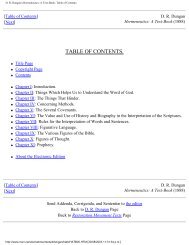Dungan - Hermeneutics
The Art and Science out interfering scripture.
The Art and Science out interfering scripture.
You also want an ePaper? Increase the reach of your titles
YUMPU automatically turns print PDFs into web optimized ePapers that Google loves.
D. R. <strong>Dungan</strong>'s <strong>Hermeneutics</strong>: A Text-Book: Chapter IV.<br />
Prof. Moses Stuart, of Andover, says:<br />
"Nearly all treatises on hermeneutics, since the days of Ernesti, have laid it down as a maxim which<br />
can not be controverted that the Bible is to be interpreted in the same manner, that is, by the same<br />
principles, as all other books. Writers are not wanting, previously to the period in which Ernesti lived, who<br />
have maintained the same thing; but we may also find some who have assailed the position before us, and<br />
labored to show that it is nothing less than a species of profaneness to treat the sacred books as we do the<br />
classic authors with respect to their interpretation. Is this allegation well grounded? Is there any good<br />
reason to object to the principle of interpretation now in question? In order to answer, let us direct our<br />
attention to the nature and source of what are now called principles or laws of interpretation: Whence did<br />
they originate? Are they the artificial production of high-wrought skill, of labored research, of profound<br />
and extensive learning? Did they spring from the subtleties of nice distinctions, from the philosophical and<br />
metaphysical efforts of the schools? Are they the product of exalted and dazzling genius, sparks of<br />
celestial fire, which none but a favored few can emit? No; nothing of all this. The principles of<br />
interpretation as to their substantial and essential elements, are no invention of man, no product of his<br />
effort and learned skill; nay, they can scarcely be said with truth to have been discovered by him. They are<br />
coeval with our nature. Ever since man was created and endowed with the powers of speech, and made a<br />
communicative and social being, he has had occasion to practice upon the principles of interpretation, and<br />
has actually done so. From the first moment that one human being addressed another by the use of<br />
language, down to the present hour, the essential laws of interpretation became, and have continued to be,<br />
a practical matter. The person addressed has always been an interpreter in every instance [51] where he<br />
has heard and understood what was addressed to him. All the human race, therefore, are, and ever have<br />
been, interpreters. It is a law of their rational, intelligent, communicative nature. Just as truly as one<br />
human being was formed so as to address another in language, just so truly that other was formed to<br />
interpret and understand what is said."<br />
(5.) More than any other thought or feelings a want of sound faith, has contributed to a wrong system<br />
of hermeneutics, and even to the abolition of all system. At a very early date, philosophies were<br />
introduced as the equal of the teaching of the apostles. And even up to the time of the Reformation, the<br />
study of Christian philosophers was thought to be more desirable than the study of Paul. And it made<br />
such a lasting impression on the minds of the people that they have not entirely recovered from it yet.<br />
Men studied Augustine, and were regarded sound, or otherwise, as they agreed with that saint. The<br />
schools of theology were not so much to study the Bible as to become acquainted with the views of their<br />
great men.<br />
Blackburne, in his "History of the Church," pp. 226, 227, gives us a good statement respecting the<br />
condition of things in the ninth century:<br />
"A subtle philosophy was brought into the controversies of the West by John Scotus Erigena<br />
(Irishman), the adviser and confidant of the French king, Charles the Bald, who had some of the tastes of<br />
his grandfather, Charlemagne. John was the teacher of the court school. He was the enigma and wonder of<br />
his time. He suddenly comes, and all at once disappears; so that we know not whence he came nor whither<br />
he went. He was undoubtedly the most learned man, and the deepest, boldest and most independent<br />
thinker of his age, in which he was neither understood nor appreciated, and he was scarcely deemed even<br />
worthy of being declared a heretic. The churchmen of Paris rectified the omission in 1209, and burnt some<br />
of his books and pantheistic followers. Though he wished to retain [52] some of the essential doctrines of<br />
Christianity, his system was one great heterodoxy, based upon Plato, Aristotle, Plotinus, and himself.<br />
http://www.mun.ca/rels/restmov/texts/ddungan/hatb/HATB04.HTM (3 of 29) [30/08/2003 11:33:02 p.m.]




